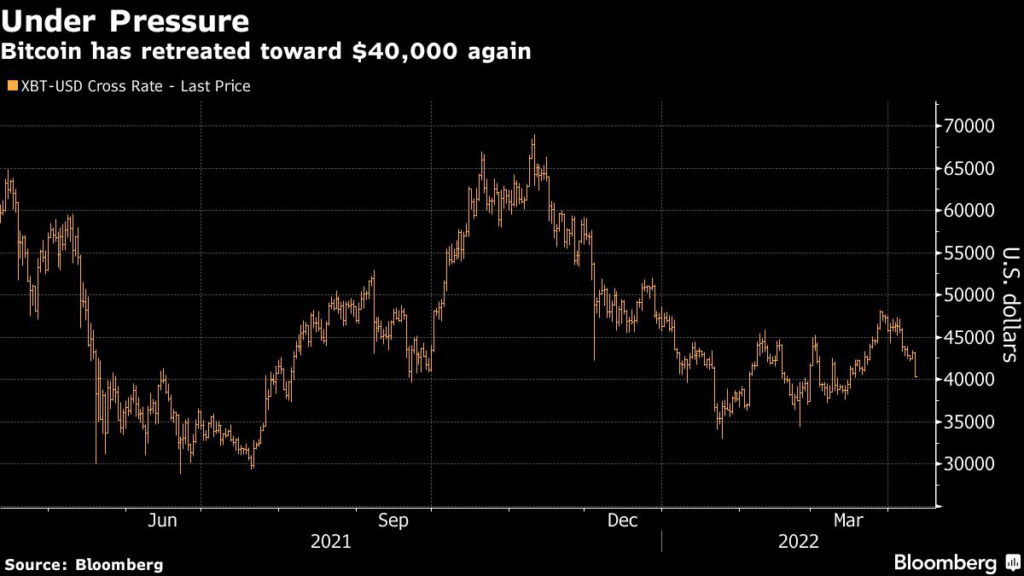(Bloomberg) — Crypto analysts typically have a difficult time deciphering any one reason why prices might be moving one way or another during a particular day or week, but they’ve got a theory for the recent slump that’s one of life’s few certainties.
Investors are selling cryptocurrencies ahead of the mid-April tax deadline in the U.S., pushing Bitcoin down more than 12% since last Monday and bringing its price down to around $40,000.
At least that’s the view of David Duong, head of institutional research at Coinbase Global Inc., who is seeing a repeat of trends that also played out in 2021. “Last year we saw market players selling digital assets to make tax-related payments,” he wrote in a recent note. Bitcoin jumped about 60% last year, following a surge of more than 300% in 2020.
Duong says that’s not the only reason cryptocurrencies are under pressure — investors are also souring on riskier assets as the Federal Reserve raises interest rates.
Even buzz generated at last week’s Bitcoin 2022 conference failed to sustain excitement. Investors last week withdrew $134 million across digital-asset products tracked by CoinShares, marking the second-largest outflow of the year. The majority of that was attributable to Bitcoin, while short-Bitcoin products saw inflows.
Last April, Bitcoin posted its first lower month of the year with a loss of near 4% for the month. And the tax-season reason resonated with other market-watchers.
“Next week is tax week — people made a lot of money last year. I mean, a lot,” Mark Yusko, CEO and CIO of Morgan Creek Capital Management, said by phone. “So a lot of people have to pay taxes. People are doing what they need to do and they’re takings some profits.”
Bitcoin, the largest crypto token, is down more than 12% since the start of last week. The decline has lopped off roughly $100 billion in the coin’s value, according to Coinmarketcap.com. Meanwhile, the MVIS CryptoCompare Digital Assets 100 index, which tracks a wide range of digital assets, on Monday alone lost 6% and is down 10% so far this month.
Still, others point to the cryptocurrency’s tendency to move in sync with other riskier assets. Both Bitcoin and U.S. stocks had a tough time last week — and at the start of this week again — and the coin’s correlation with the Nasdaq 100 Index is now back at record levels.
“From my perspective, they’re risk assets and they’re acting more like risk assets,” said Jon Maier, chief investment officer at Global X. “During the initial Russian invasion into Ukraine and the collapse of the ruble, Russians were using the assumption that there’d be a greater use of Bitcoin as a currency and there was an uptick there. But I would say more recently they’ve been acting like risk assets.”
More stories like this are available on bloomberg.com
©2022 Bloomberg L.P.











